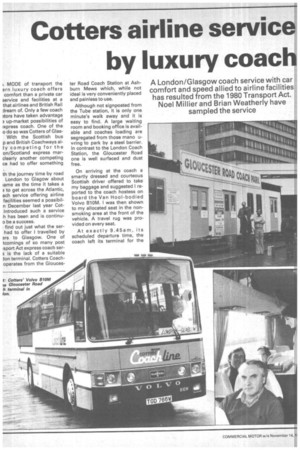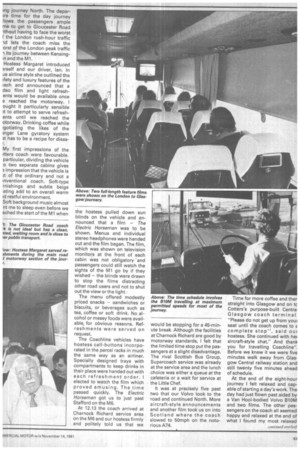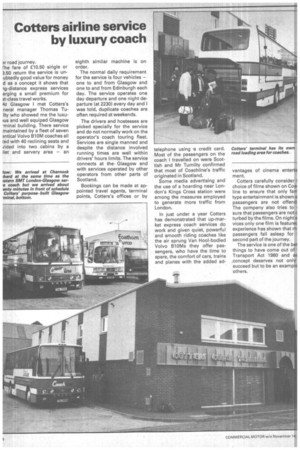Cotters airline service by luxury coach
Page 52

Page 53

Page 54

If you've noticed an error in this article please click here to report it so we can fix it.
A London/Glasgow coach service with car comfort and speed allied to airline facilities has resulted from the 1980 Transport Act. Noel Millier and Brian Weatherly have sampled the service
k MODE of transport the am luxury coach offers comfort than a private car service and facilities at a that airlines and British Rail iream of. Only a few coach itors have taken advantage 3 up-market possibilities of ixpress coach. One of the
o do so was Cotters of G I as With the Scottish bus p and British Coachways al1 y competing for the on/Scotland express marclearly another competing ce had to offer something
th the journey time by road London to Glagow about :ame as the time it takes a 3 to get across the Atlantic, ach service offering airline facilities seemed a possibiln December last year Cotintroduced such a service
h has been and is continu o be a success.
find out just what the serhad to offer I travelled by .irs to Glasgow. One of tcomings of so many post sport Act express coach ser i is the lack of a suitable on terminal. Cotters Coachoperates from the Glouces ter Road Coach Station at Ashburn Mews which, while not ideal is very conveniently placed and painless to use.
Although not signposted from the Tube station, it is only one minute's walk away and it is easy to find. A large waiting room and booking office is available and coaches loading are segregated from those mano uvring to park by a steel barrier. In contrast to the London Coach Station, the Gloucester Road one is well surfaced and dust free.
On arriving at the coach a smartly dressed and courteous Scottish driver offered to take my baggage and suggested I reported to the coach hostess on board the Van Hool-bodied Volvo 1310M. I was then shown to my allocated seat in the nonsmoking area at the front of the vehicle. A travel rug was provided on every seat.
At exactly 9.45am, its scheduled departure time, the coach left its terminal for the
)ng journey North. The deparire time for the day journey lows the passengers ample me to get to Gloucester Road ithout having to face the worst [the London rush-hour traffic id lets the coach miss the orst of the London peak traffic its journey between Kensingrt.) and the Ml.
Hostess Margaret introduced 3rself and our driver, Ian. In Je airline style she outlined the ifety and luxury features of the rach and announced that a deo film and light refreshents would be available once
reached the motorway. I ought it particularly sensible it to attempt to serve refreshents until we reached the otorway. Drinking coffee while igotiating the likes of the Inger Lane gyratory system st has to be a recipe for disasr.
My first impressions of the itters coach were favourable. particular, dividing the vehicle :o two separate cabins gives ?, impression that the vehicle is it of the ordinary and not a inventional coach. Soft-type rnishings and subtle beige ating add to an overall warm id restful environment.
Soft background music almost nt me to sleep even before we ached the start of the M1 when the hostess pulled down sun blinds on the vehicle and announced that a film — The Electric Horseman was to be shown. Menus and individual stereo headphones were handed out and the film began. The film, which was shown on television monitors at the front of each cabin was not obligatory and passengers could still watch the sights of the M1 go by if they wished — the blinds were drawn to stop the films distracting other road users and not to shut out the view or the light.
The menu offered modestly priced snacks — sandwiches or biscuits, or beverages such as tea, coffee or soft drink. No alcohol or messy foods were available, for obvious reasons. Refreshments were served on request.
The Coachline vehicles have hostess call-buttons incorporated in the parcel racks in much the same way as an airliner. Specially designed trays with compartments to keep drinks in their place were handed out with each refreshment order. I elected to watch the film which proved amusing. The time passed quickly. The Electric Horseman got us to just past Stafford on the M6.
At 12.13 the coach arrived at Charnock Richard service area on the M6 and our hostess firmly and politely told us that we would be stopping for a 45-minute break. Although the facilities at Charnock Richard are good by motorway standards, I felt that the limited time stop put the passengers at a slight disadvantage. The rival Scottish Bus Group, Supercoach service was already at the service area and the lunch choice was either a queue at the cafeteria or a wait for service at the Little Chef.
It was at precisely five past two that our Volvo took to the road and continued North. More aircraft-style announcements and another film took us on into Scotland where the coach slowed to 50mph on the notorious A74.
Time for more coffee and ther straight into Glasgow and on tc Cotters's purpose-built Centra Glasgow coach terminal "Please do not get up from your seat until the coach comes to e complete stop—, said our hostess. She continued with her aircraft-style chat," And thank you for travelling Coachline". Before we knew it we were five minutes walk away from Glasgow Central railway station and still twenty five minutes ahead of schedule.
At the end of the eight-hour journey I felt relaxed and capable of starting a day's work. The day had just flown past aided by a Van Hool-bodied Volvo B1OM and two films. The other passengers on the coach all seemed happy and relaxed at the end of what I found my most relaxed
3r road journey.
rhe fare of £10.50 single or 3.50 return the service is unubtedly good value for money d as a concept it shows that 1g-distance express services arging a small premium for it-class travel works.
At Glasgow I met Cotters's neral manager Thomas Tufty who showed me the luxulus and well equiped Glasgow -minal building. There service maintained by a fleet of seven 3ntical Volvo BlOM coaches all ted with 40 reclining seats and vided into two cabins by a ilet and servery area — an
eighth similar machine is on order.
The normal daily requirement for the service is four vehicles — one to and from Glasgow and one to and from Edinburgh each day. The service operates one day departure and one night departure (at 2230) every day and I was told, duplicate coaches are often required at weekends.
The drivers and hostesses are picked specially for the service and do not normally work on the operator's coach touring fleet. Services are single manned and despite the distance involved running times are well within drivers' hours limits. The service connects at the Glasgow end with services operated by other operators from other parts of Scotland.
Bookings can be made at appointed travel agents, terminal points, Cotters's offices or by telephone using -a credit card. Most of the passengers on the coach I travelled on were Scottish and Mr Tumilty confirmed that most of Coachline's traffic originated in Scotland.
Some media advertising and the use of a hoarding near London's Kings Cross station were among the measures employed to generate more traffic from London.
In just under a year Cotters has demonstrated that up-market express coach services do work and given quiet, powerful and smooth riding coaches like the air sprung Van Hool-bodied Volvo B10Ms they offer passengers, who have the time to spare, the comfort of cars, trains and planes with the added ad vantages of cinema enterta ment.
Cotters carefully consider 1 choice of films shown on Coal line to ensure that only fair type entertainment is shown a passengers are not offend The company also tries to I sure that passengers are not c turbed by the films. On night s vices only one film is featurec experience has shown that m passengers fall asleep for I second part of the journey.
The service is one of the bet things to have come out of Transport Act 1980 and as ,concept deserves not only succeed but to be an exampl€ others.






















































































